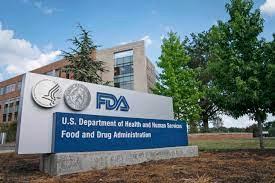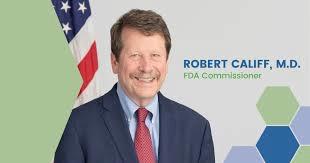 The FDA has experienced a series of food-related crises, adverse press reports, the resignation of Frank Yiannas and Congressional pressure. Following an external review the FDA Commissioner, Robert Califf, has provided what he characterizes as a “rough draft of a plan” to reorganize food-related responsibilities of the Food and Drug Administration. His intent is to restore the position of Deputy Commissioner of Foods, injudiciously eliminated by the previous short-term Commissioner, Dr. Scott Gottlieb, appointed by the previous Administration.
The FDA has experienced a series of food-related crises, adverse press reports, the resignation of Frank Yiannas and Congressional pressure. Following an external review the FDA Commissioner, Robert Califf, has provided what he characterizes as a “rough draft of a plan” to reorganize food-related responsibilities of the Food and Drug Administration. His intent is to restore the position of Deputy Commissioner of Foods, injudiciously eliminated by the previous short-term Commissioner, Dr. Scott Gottlieb, appointed by the previous Administration.
The proposed changes are intended to consolidate oversight of food within the FDA and restore some of the organizational improvements introduced by a previous Commissioner, Dr. Margaret Hamburg during her tenure from 2009 to 2015.
 Under the Califf proposal, a Deputy Commissioner for Human Foods would report to the Commissioner and would administer the Human Foods Program. The FDA announcement indicated that there would be a nationwide search to recruit this incumbent. Considerable time and money could be saved if Frank Yiannas previously the FDA Deputy Commissioner for Food, Policy and Response could be persuaded to take the position, given his experience in industry and his knowledge of the Agency. In his more than gracious January 25th letter of resignation he cataloged achievements in improving aspects of regulation of the food supply. He urged consolidation of various entities within the FDA with the need to empower the Deputy Commissioner for Foods with line authority commensurate with the responsibility to protect the Nation’s food supply.
Under the Califf proposal, a Deputy Commissioner for Human Foods would report to the Commissioner and would administer the Human Foods Program. The FDA announcement indicated that there would be a nationwide search to recruit this incumbent. Considerable time and money could be saved if Frank Yiannas previously the FDA Deputy Commissioner for Food, Policy and Response could be persuaded to take the position, given his experience in industry and his knowledge of the Agency. In his more than gracious January 25th letter of resignation he cataloged achievements in improving aspects of regulation of the food supply. He urged consolidation of various entities within the FDA with the need to empower the Deputy Commissioner for Foods with line authority commensurate with the responsibility to protect the Nation’s food supply.
Dr. Califf may be an excellent research scientist and hospital administrator but he appears reticent to apply sound principles of organization. His “draft plan” is, at best, fuzzy and deviates from Congressional intent and knowledgeable advice. The rough draft does not have clear lines of authority and responsibility. Califf is rearranging the deck chairs of the Titanic and avoiding radical change to organization and culture. Unless he establishes a clearly defined, integrated and comprehensive human foods program encompassing research and regulation, the FDA will continue to respond reactively to crises.

The plan calls for a Center for Excellence in Nutrition to serve as an informational entity advising consumers on food choices. An Office of Critical Foods mandated by the 2023 Consolidated Appropriations Act will function within this Center. The Office of Integrated Food Safety Systems Partnerships will attempt to coordinate response activities with state and local regulatory agencies. The FDA will establish a Human Foods Advisory Committee to consider emerging issues and innovation.
Following the recommendations of the Reagan-Udall report, FDA will introduce advanced information technology and analytical modalities. The Office of Regulatory Affairs will support the human foods program and will concentrate on inspections, laboratory assays, investigations and imports.
In the short term Dr. Califf intends for the Centers for Food Safety and Applied Nutrition, the Office of Regulatory Affairs and the Office of Food Policy and Response to report directly to him. This extends his management span beyond what would be regarded as optimal and will be a recipe for infighting and incoordination.
 At the end of the day, the most logical reorganization would be to separate food from the existing FDA with the Agency then concentrating on drugs and medical devices. A new Food Safety Agency would, however, only operate efficiently if it incorporated the current responsibilities of the Food, Safety and Inspection Service of the USDA. Radical interdepartmental reorganization would allow a dedicated team of scientists, administrators and regulators to concentrate on all aspects of food, both domestic and imported. The proposed Food Safety Agency would operate in the same way as the EPA and would require Congressional involvement through enabling legislation and funding. The current situation with two major departments and many agencies having some involvement in food policy and regulation is inefficient. A pizza may fall under the jurisdiction of the FDA but if it has a meat topping, the FSIS is involved. We cannot afford a pizza mentality where disparate agencies fight for turf, funding, head counts and status.
At the end of the day, the most logical reorganization would be to separate food from the existing FDA with the Agency then concentrating on drugs and medical devices. A new Food Safety Agency would, however, only operate efficiently if it incorporated the current responsibilities of the Food, Safety and Inspection Service of the USDA. Radical interdepartmental reorganization would allow a dedicated team of scientists, administrators and regulators to concentrate on all aspects of food, both domestic and imported. The proposed Food Safety Agency would operate in the same way as the EPA and would require Congressional involvement through enabling legislation and funding. The current situation with two major departments and many agencies having some involvement in food policy and regulation is inefficient. A pizza may fall under the jurisdiction of the FDA but if it has a meat topping, the FSIS is involved. We cannot afford a pizza mentality where disparate agencies fight for turf, funding, head counts and status.
In the short term, Dr. Califf should implement what has been advised, consolidate and facilitate an eventual transition to a Federal Food Safety Agency. As a signal that the FDA will not tolerate dereliction of duty and incompetence he should consider firing those individuals who sat on the Abbott whistle blower’s report for months and did nothing to avert the infant formula crisis. Those who received the report by registered mail apparently kept it from Frank Yiannas who would have reacted more forcefully but the structure imposed on the FDA and those who subscribed to a culture of indifference contrived to sequester him in a bubble.
We hope for changes but it unfortunately takes a catastrophic event such as the 9/11 attacks to result in a Department of Homeland Security consolidating disparate agencies that collectively failed to develop a proactive approach to national security. Until the changes suggested by the Reagan-Udall Commission are implemented and functional our food supply is at risk. Congress should revisit the concept of a Food Safety Agency since Dr. Califf is applying a band aid to a lesion that requires radical surgery.